by Brooks Riley
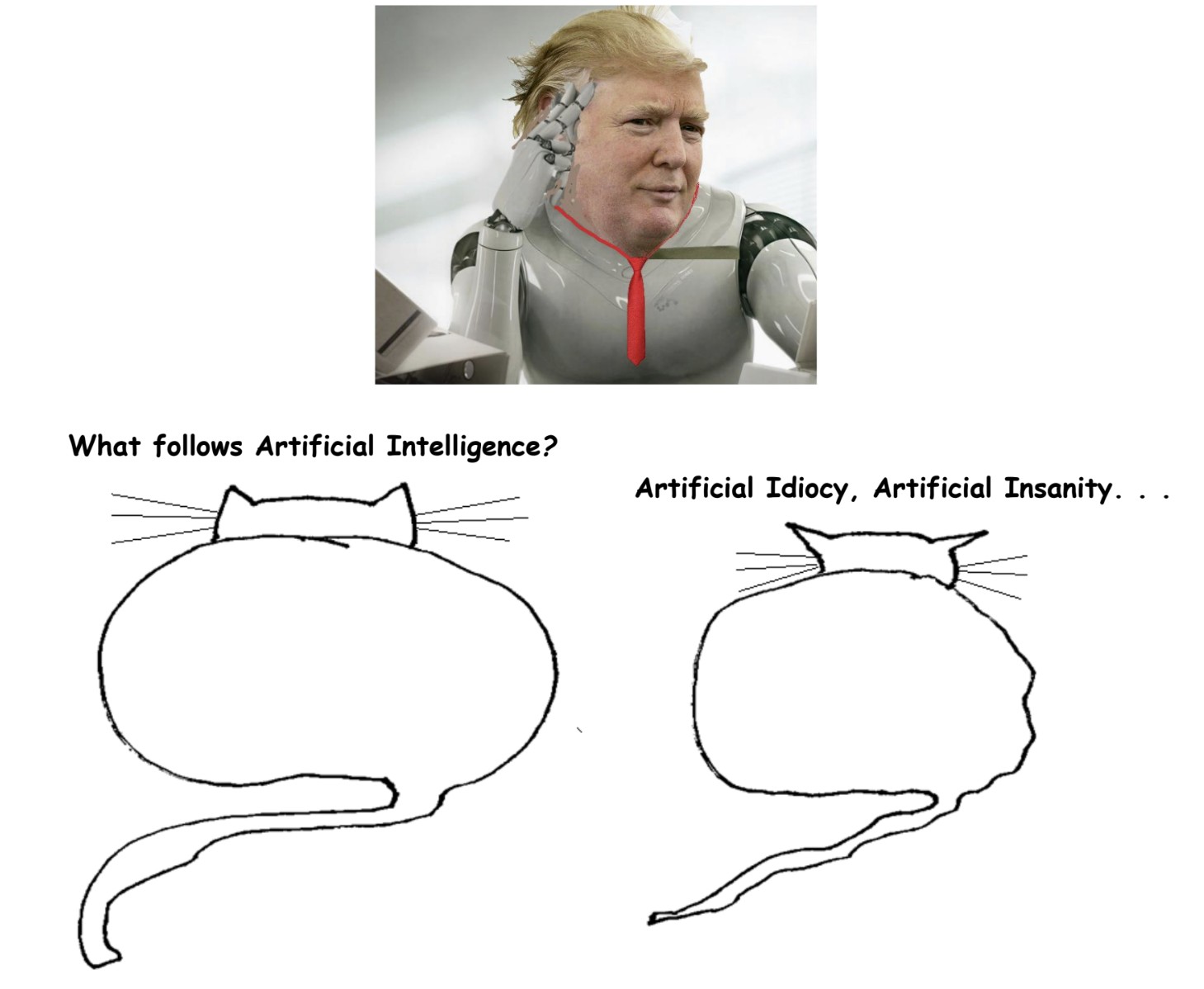
Though we are an aggregator blog (providing links to content elsewhere) on all other days, on Mondays we have only original writing by our editors and guest columnists. Each of us writes on any subject we wish, and the length of articles generally varies between 1000 and 2500 words. Our writers are free to express their own opinions and we do not censor them in any way. Sometimes we agree with them and sometimes we don’t.Below you will find links to all our past Monday columns, in alphabetical order by last name of the author. Within each columnist’s listing, the entries are mostly in reverse-chronological order (most recent first).
by Brooks Riley

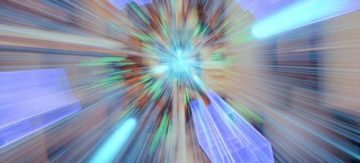
During the last half of the 20th century various groups of insiders and outsiders adopted mind-altering drugs and computer technology to create cultural spaces in which we imagined and realized new venues for the human mind. These spaces engaged fundamental issues of freedom and control, of emotion and reason, which have bedeviled humans everywhere, and elaborates them in the through modern science and technology. The psychoactive drugs which, in some sense, free us, have been synthesized through laboratory techniques we have invented, but only recently. The computers which extend our powers of control and order in often surprising ways embody logical forms that date back to Aristotle but where only recently brought to fruition in the late nineteenth century work of George Boole and others. Science and technology thus provide us with objective physical touchstones for the otherwise abstract powers and activities of our hearts and minds.
Taken together with that great Victorian invention, childhood innocence, the technologies of drugs and computers would constitute a cultural arena which served as incubator, nursery, and playground for some of the major lines of development in late twentieth century culture. For, if a society is to progress it needs cultural playgrounds where new ideas can be conceived, tested and developed. Psychedelic drugs and computing – and their associated cultures – functioned as such playgrounds in the latter half of the 20th century. They were, in fact, among the most important cultural playgrounds in America.
Given the fundamental differences between drugs and computers – what they are and how people use them, between Dionysian drugs and Apollonian computers – it is not surprising that different groups of people have been most interested in one or the other. What is most curious is that these people, and their creations, have often interacted, either directly or indirectly. In some cases, drug people and computer people are one and the same, as was the case in the San Francisco-Silicon Valley area during the 1970s. Read more »
by Marie Snyder
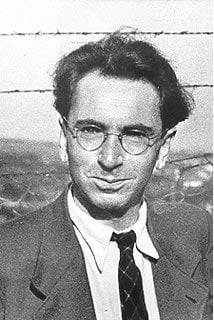 The second half of Frankl’s Man’s Search for Meaning was added in 1962 to provide greater detail of Logotherapy, in which patients must hear difficult things in contrast to psychoanalysts provoking telling difficult things. It’s less introspective and more focused on our place in the world:
The second half of Frankl’s Man’s Search for Meaning was added in 1962 to provide greater detail of Logotherapy, in which patients must hear difficult things in contrast to psychoanalysts provoking telling difficult things. It’s less introspective and more focused on our place in the world:
“Logotherapy defocuses all the vicious-circle formations and feedback mechanisms which play such a great role in the development of neuroses. Thus the typical self-centeredness of the neurotic is broken up instead of being continually fostered and reinforced . . . the patient is actually confronted with and reoriented toward the meaning of his life. . . . Striving to find a meaning in one’s life is the primary motivational force in man. That is why I speak of a will to meaning in contrast to the pleasure principle on which Freudian psychoanalysis is centered, as well as in contrast to the will to power on which Adlerian psychology, using the term ‘striving for superiority,’ is focused” (98).
Aside: A bit of history of philosophy here: Schopenhauer wrote about the will-to-live in World as Will and Representation in 1818: our very being is our will, our blind urges towards life, and it’s also the dynamic essence of the world. He was influenced by the Buddhist Four Noble Truths in this respect, although he focused less on the practice of decreasing striving in order to reduce the experience of suffering. He preferred to soothe his misery with art. Read more »
by Jeroen Bouterse
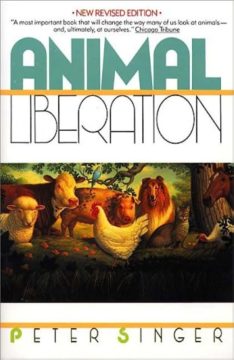 Human treatment of animals is a moral calamity at an outrageous scale, that I can get from zero to really quite worked up about in a matter of seconds. For fear of hurting the cause, I allow myself to take part in polite conversation about the dead bodies on the dinner table only if there is a more soft-spoken ally nearby. Two minutes into the conversation, when I find myself suppressing the urge to yell at a meat apologist how that kind of excuse might equally well be used to justify eating human babies, I am often grateful that there is somebody who can steer the conversation instead towards the socially acceptable topic of plant-based recipes.
Human treatment of animals is a moral calamity at an outrageous scale, that I can get from zero to really quite worked up about in a matter of seconds. For fear of hurting the cause, I allow myself to take part in polite conversation about the dead bodies on the dinner table only if there is a more soft-spoken ally nearby. Two minutes into the conversation, when I find myself suppressing the urge to yell at a meat apologist how that kind of excuse might equally well be used to justify eating human babies, I am often grateful that there is somebody who can steer the conversation instead towards the socially acceptable topic of plant-based recipes.
It especially helps if they look fit (which they always do!), and are able to say with a straight face that “it’s perfectly simple to lead a healthy lifestyle and cook a tasty dinner without using meat”. Meanwhile, I don’t know how to cook a tasty dinner no matter the ingredients, and I have rarely given a moment’s thought to what it takes to lead a healthy lifestyle. It’s completely beside the point, is what I’m really thinking while nodding along. We were not talking about precisely how full of life everyone feels when their alarm clock rings, were we; we were talking about the food on your plate; about the moral issue, about the crime …
Luckily, things do not depend on my ability to express myself eloquently and effectively without alienating everyone present. I can also simply try to nudge people towards reading Peter Singer, especially now that he published an updated version of his Animal Liberation. What follows are basically my notes from reading this 2023 edition, with very few thoughts of my own mixed in. If you have immediate access to the book itself, switch to that; if not, you might as well keep on reading and buy or borrow it afterwards. Read more »
by Bill Murray
 We’re here early this year. June has just gotten started, and after a day or two of intermittent rain with a blustery sky and a stiff wind off Lake Saimaa, fifty degrees Fahrenheit feels a lot colder than the same back in Atlanta. I’ve just learned that it hasn’t been this cold in June since 1968. It snowed today right down the road. The paper took the laconic approach and called it the ‘first snow’ of summer. On the other side of the comfort ledger, we have a fire of easy to light birchwood, and if the Finns understand one thing well, it’s insulation.
We’re here early this year. June has just gotten started, and after a day or two of intermittent rain with a blustery sky and a stiff wind off Lake Saimaa, fifty degrees Fahrenheit feels a lot colder than the same back in Atlanta. I’ve just learned that it hasn’t been this cold in June since 1968. It snowed today right down the road. The paper took the laconic approach and called it the ‘first snow’ of summer. On the other side of the comfort ledger, we have a fire of easy to light birchwood, and if the Finns understand one thing well, it’s insulation.
We come to Finland every summer. The best time to visit is July into August, when the lakes have had a chance to warm, it never gets completely dark, and saunas and swimming are in full swing. To heat your naked body just past tolerable in an old wooden building and then run screaming and jump in the lake is the national pastime.
It’s not time for that yet. Already the days are long again but this year at least, the nights are still jacket-and-gloves cool down on the water, where the fish are jumping and the bird life thrives.
Never in my life have I heard a swan demonstrate the Doppler effect. But such utter silence reigns in the twilight after midnight, when our bit of the lake is glassy still, that far back to the southeast I heard the steady repetition of a swan’s two-note honking from beyond a stand of spruces.
For perhaps half a minute she approached, wings stroking a meter above the water, neck extended, churning forward and back stroke by stroke, steady honking, and in her wake her cry changed pitch as surely as a two-toned Parisian ambulance on the motorway. She continued the half kilometer further I could see her, flying upstream above the lake, announcing her arrival all along the way. Read more »
by Sarah Firisen
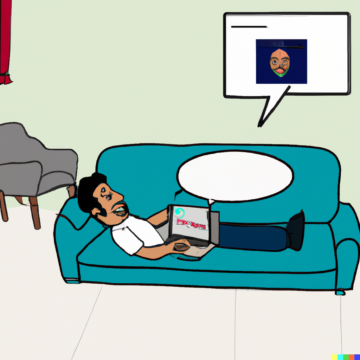
During the height of lockdown, I was stressed. We were all stressed. We were scared of getting sick and terrified that the most vulnerable among our friends and family would get sick. We were anxious and bored, but many of us, more than anything, were lonely. Very, very lonely. My husband worked out of the house at night and slept during the day. So even though I was one of the lucky ones and did have another human presence in the house, that presence mainly manifested as a lump under the bedclothes. Many people had no one, and there was a surge in pet adoptions as people looked for anything to help cope with the day-after-day overwhelming loneliness.
Before COVID, I attended a regular kickboxing studio. A month or two before lockdown, a random group of students gathered to celebrate one woman’s birthday. I knew some of the women well, some not at all. Many I’d smiled at over the years I’d been attending the class but had never talked with. We had so much fun at that dinner that we decided to do it again and said we’d use the Facebook chat from the original dinner to coordinate. Then, COVID happened, and we started chatting as a group. First, occasionally, but as we all became lonelier and more desperate for company, it became a constant scrolling chat about parenting, marriage, TV shows, anything and everything. The one thing we all agreed on was that the connection we made to each other, through that chat, in those hard times was a lifesaver (we’re still friends, and we still use the chat even though we meet regularly now in person.) Read more »
by Tim Sommers
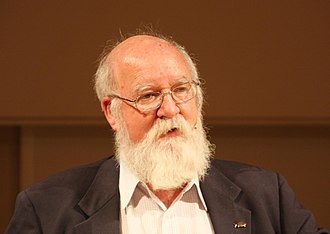
Widely-respected philosopher, Tufts professor, one of the “Four Horsemen of the Apocalypse” of the New Atheists’ movement, and an “External Professor” for the prestigious Santa Fe Institute, Daniel Dennett recently took to the very public soap box of The Atlantic to issue a dire warning.
“Today, for the first time in history, thanks to artificial intelligence, it is possible for anybody to make counterfeit people who can pass for real in many of the new digital environments we have created. These counterfeit people are the most dangerous artifacts in human history, capable of destroying not just economies but human freedom itself. Before it’s too late (it may well be too late already) we must outlaw both the creation of counterfeit people and the ‘passing along’ of counterfeit people. The penalties for either offense should be extremely severe, given that civilization itself is at risk.”
“The most dangerous artifacts in human history?” What about gunpowder, the printing press, chemical weapons, fission bombs, fusion bombs, biological weapons, machines that burn massive amounts of fossil fuels and dump carbon into the atmosphere, Adam Sandler movies, social media in general, and TicTok in particular?
Before I say anything else I should say that Dennett is not only a brilliant philosopher, but also a charming, affable, and generous person. At public events he seems to make a special effort to seek out and spend time with students. I could say more, but you get the idea. Read more »
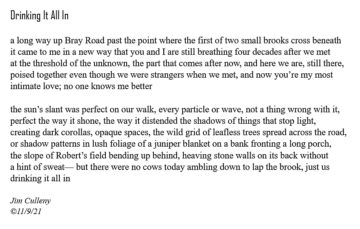
by Jonathan Kujawa
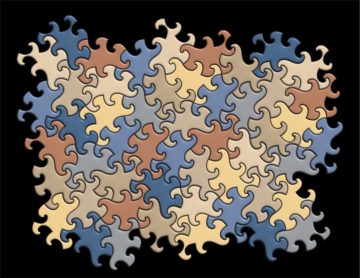
In March David Smith, Joseph Samuel Myers, Craig S. Kaplan, and Chaim Goodman-Strauss announced that they discovered an “Ein Stein”. The choice of name can only be described as a tour-de-force of PR: Ein Stein translates as One Stone but also evokes a certain physicist. The Ein Stein got wide play in the media, including here at 3QD. Unfortunately, the same authors’ discovery of the “Spectre” tile two weeks ago seems to have gone under the radar. Since it is even more interesting, I thought we should take the time to talk about it.
First off, what is this all about? This research is in the area of geometry about tilings of the plane. If you have a collection of tiles of various shapes and sizes along with a set of rules about how they can be placed, then a successful tiling of the plane with those tiles and rules is exactly what you think: you cover the entire plane going to infinity in all directions using only those tiles and following those rules [1].

Sometimes this is easy. If you have a rectangular tile with no rules restricting you, you see successful tilings all around you in the brickwork. If you use a rectangle with no rules, there are infinitely many different tilings.
Sometimes tiling the plane is impossible. If you have only a circular tile, then there is no way to tile the plane without leaving gaps. Sometimes it is the rules which cause a problem. If you have a triangular tile, but the rule says you aren’t allowed to rotate the tile, then there is a triangular tiling (here on the right), but it’s forbidden by the rule [2].
One common way of enforcing rules is to color the tiles and make requirements on where colors can be placed relative to each other. We discussed these sorts of tilings ages ago here at 3QD. Read more »
by Ashutosh Jogalekar
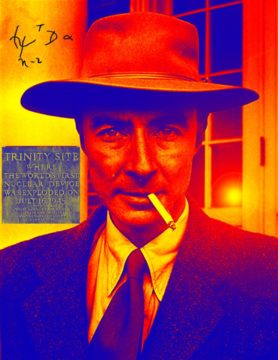
This is the fifth in a series of essays on the life and times of J. Robert Oppenheimer. All the others can be found here.
Between December, 1941, when the United States entered the Second World War and July, 1945, when the war ended and two revolutionary weapons had been used against Japan, Robert Oppenheimer underwent an astonishing transformation that stunned his colleagues. From being an ivory tower intellectual who quoted French and Sanskrit poetry and who had led nothing bigger than an adoring group of graduate students and postdocs – not even a university department – he became the successful leader of the largest scientific and industrial enterprise in history, rubbing shoulders with cabinet secretaries and generals and directing the work of tens of thousands of individuals – Nobel laureates and janitors, physicists and chemists and mathematicians, engineers and soldiers and administrative staff. One cannot understand this transformation without tracing its seed back to momentous scientific and political world events in that troubled decade of the 1930s. I can barely scratch the surface of these events here; there is no better source that describes them than Richard Rhodes’s seminal book, “The Making of the Atomic Bomb.”
In December, 1938, working at the Kaiser Wilhelm Institute in Berlin, chemists Otto Hahn and Fritz Strassman found that uranium, when bombarded by neutrons, split into two small, almost equal fragments, a process that came to be called nuclear fission. This transformation was completely unexpected – the atomic nucleus was thought to be relatively stable. While physicists had bombarded elements with neutrons since the discovery of the elementary particle in 1932, all they had seen was the chipping off or building up of nuclei into elements one or two places above in the periodic table; the breaking up of uranium into much smaller elements like barium and xenon was stunning. When Hahn wrote his colleague Lise Meitner – an Austrian Jewish physicist in exile in Sweden – and her nephew Otto Frisch about this result, the two physicists prophetically figured out on a hike that the process would release energy that could be explained by Einstein’s famous equation, E =mc^2. When uranium breaks up, the two resulting pieces weigh slightly less than the parent uranium – that tiny difference in mass translates to a huge difference in energy according to Einstein’s formula. How huge? Several million times more than in the most energetic chemical reactions. Read more »
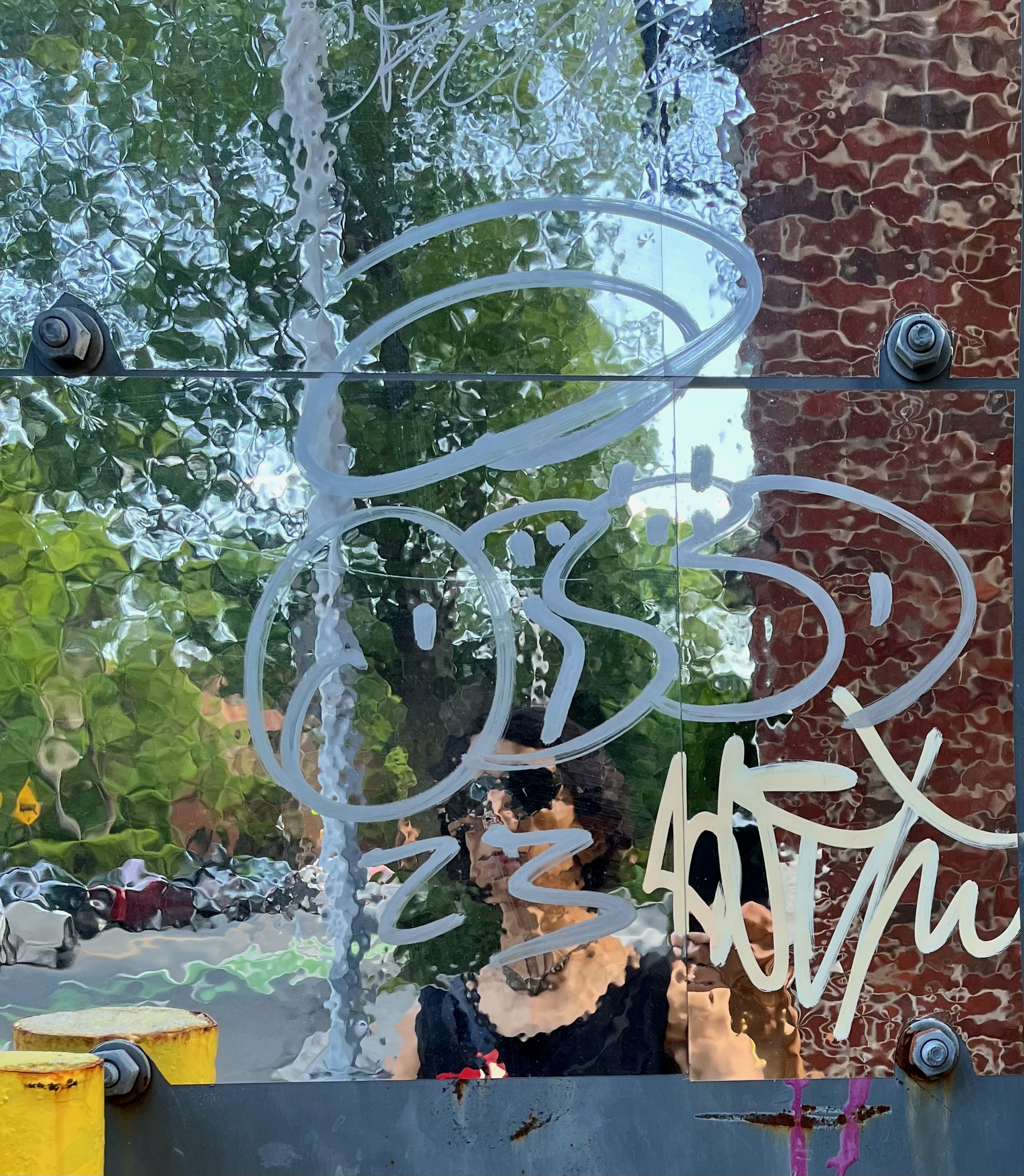 Sughra Raza. Self-portrait On Graffiti In The Rain. June 2023.
Sughra Raza. Self-portrait On Graffiti In The Rain. June 2023.
Digital photograph.
by Chris Horner

What should we look for in literature? And in the arts and humanities in general? It’s a large question with many answers, some better than others: entertainment, edification, elevation – and much more. A more limited question might be: what is the point of studying it?
Let’s stick with literature as our example.Think of all the students studying the novel, poetry, drama, essays and more. A multitude of students, teaching staff, departments and institutions. And an awful lot of money, much of it in the form of debt. Assuming that at least some of those who enrol and don’t go on to an academic career will want to go and read, see and listen to the things they wrote essays about in school and college, what is is it supposed to mean for them? I got to thinking about that after being present at a conversation about an author (DH Lawrence) between an academic and a reader who had obtained a degree in English and American literature over forty years ago. It went something like this:
Graduate: DH Lawrence is a very interesting writer.
Academic: I agree.
Graduate: The value of Lawrence is both in what he wants to say about life, and the way in which he says it – the art of the The Rainbow, Women in Love, the poetry – Lawrence has an urgent message for us about one’s life and how it might be more richly lived. How do your students respond to it?
Academic: Well, that’s not really what we are interested in at [well known UK university].
Reader: How can it not be?
Academic: We don’t approach any text with that kind of thing in mind. What we study and teach is the social and historical context in which it was produced, the the social background to the text’s production, the forces that shape and mark it: political, economic, questions of gender etc are all important aspects: the discursive and ideological forces that shaped it and made it part, or not part, of the canon.
Reader: But isn’t that missing the point of what DHL has to say? I think he has something to say to me. Of course he is open to criticism – but that’s what the study of literature is about, isn’t it? The questions of value that are raised in our reading of great literature?
Academic: it’s naive to just pick up a text and think of it as speaking to you in an unmediated way, just like that.
The conversation went on, but didn’t really get much further than the positions I’ve very roughly outlined above. The subject was literature but it could surely have been about all sorts of cultural production – the visual arts, for instance. Read more »
by Brooks Riley
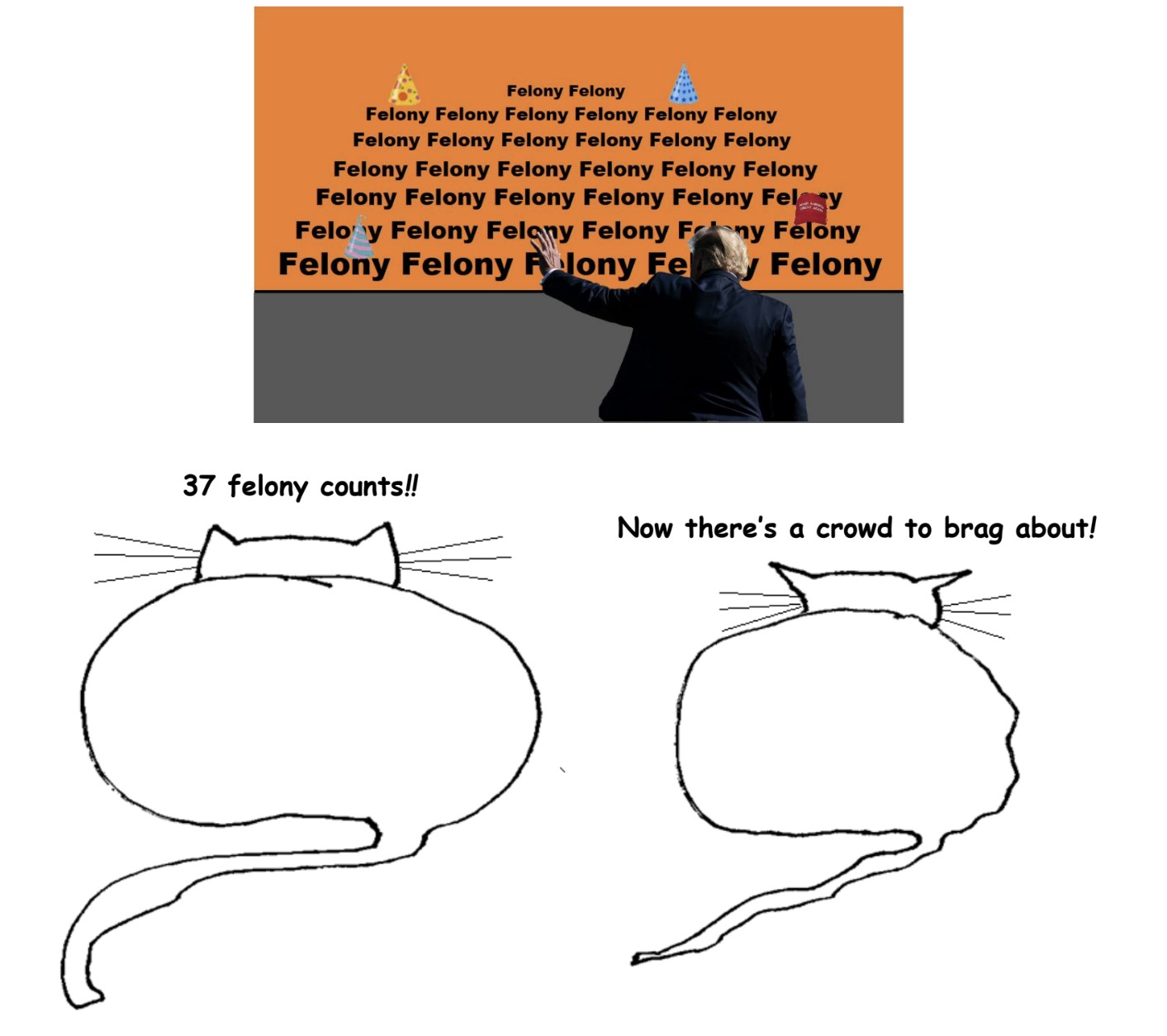
by Eric Bies
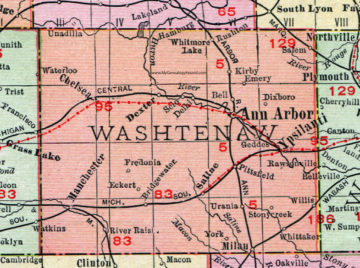 But—let’s be honest—to me he’s Dad.
But—let’s be honest—to me he’s Dad.
It’s just the sentence seems better how I have it up there in the title, more satisfying given its slight alliterative lilt, more interesting, rhythmically, to frustrate what otherwise would render as absolute sing-song.
My father is full of stories.
He grew up on a modest farm in a city—a town? a village?—what Wikipedia informs me is an unincorporated community, boasting “no legally defined boundaries or population statistics.”
In January of 2024, Dad’s dad will turn a hundred and three—if I were Julius Caesar I’d say CIII—a rather remarkable number and a very respectable age for a member of our species.
Dad’s dad doesn’t often figure in Dad’s stories. This is because Dad’s stories have everything to do with being five or six years old in the early sixties, running free on a modest farm in an unincorporated community whose citizenry we can’t call numberless but simply unnumbered.
Suffice to say where Dad grew up was and remains right on the perilous edge of what soft-palmed suburbanites like myself rarely shy from dubbing Nowhere.
It’s an exceedingly picturesque Nowhere—the kind of place people like me go to be turkeys, tracing the mazes and lanes of green corn to stand open-mouthed and drooping-combed beneath unassailable stretches of blue—and there’s nowhere I can picture Dad’s stories springing from but there.
When I was a boy Dad told me what it was like when he was a boy. Read more »

Glasses on a shelf in a restaurant in Brixen, South Tyrol.
by Paul Braterman
One month ago today, Ken Ham of Answers in Genesis appointed Martyn Iles, formerly director of the Australian Question Lobby, to the position of Chief Ministry Officer, ministry of course being Answers in Genesis’ core activity. Here’s why that matters.
 Martyn Iles, a lawyer by training, was the managing director of the Australian Christian Lobby (ACL) from 2018 until he was abruptly sacked by the ACL Board in February 2023. Accounts of his dismissal differ. Iles described it as a result of difference in strategy; the Board wanted to move in a more political direction, making him in his own words “not the right person for that vision. I have always been a preacher first and politician second (or third…)”. The Board’s chair, however, denied that there had been any such change.
Martyn Iles, a lawyer by training, was the managing director of the Australian Christian Lobby (ACL) from 2018 until he was abruptly sacked by the ACL Board in February 2023. Accounts of his dismissal differ. Iles described it as a result of difference in strategy; the Board wanted to move in a more political direction, making him in his own words “not the right person for that vision. I have always been a preacher first and politician second (or third…)”. The Board’s chair, however, denied that there had been any such change.
Answers in Genesis (AiG) is the world’s largest Young Earth Creationist organisation. AiG has a full-time working staff of 1200 and, according to its 2021 tax declaration, assets of almost $82 million. It owns the Creation Museum and the Ark Encounter in Kentucky as well as other major assets, and its massive outreach programme includes formal publications, Answers magazine, and an extremely active website.
AiG is the property of Ken Ham, like Iles a product of Australian’s extreme Christian fundamentalist community. It was set up in 1994 after complex and litigious manoeuvres involving Ham and his previous associates, Creation Ministries International based mainly in Australia, and the Institute for Creation Research (ICR). ICR itself had been set up by Henry Morris, co-author of The Genesis Flood, when disputes arose among an earlier generation of Young Earth creationists. Read more »
by Ethan Seavey
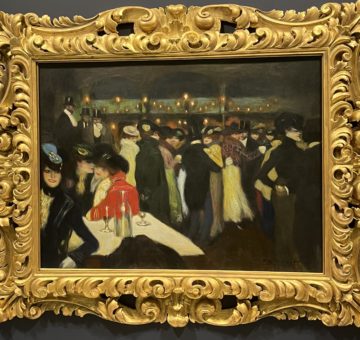
This is your sign to acknowledge that it is pride month and that pride comes from decades of unvalued work by Black and Latinx queer people and that pride month would not exist without their strength and that you should watch the film Paris is Burning because you’ve lived 23 years as a white queer person and keep hearing about it and you should listen to it now, because it’s temporarily available on the airline catalog of free movies (for pride month, to be taken away at the end of it…).
18 minutes and 20 seconds in: a voiceover.
When you’re a man and a woman, you can do ANYTHING [ANYTHING being a word enunciated and drawn out slowly, taffy-pulling, teeth-pulling]
you can-
you can almost have sex on the streets if you want to [if you want to, why would you want to, out in the middle of the pavement? the gays cannot understand this heterosexual urge because gays find comfort in bushes and forests and dark hideyholes in parks where you have the freedom to not be seen by anyone you don’t want to see you and to run away and blend back into crowds for safety—out in the street, that is a liberation I fear & do not want]
the most somebody gonna say is “hey you gotta hump for me?”
(clap) you know
but when you’re gay [syntactically intertwining “but” with the word “gay”; always an exception, always an oversight, always a “but when you’re” statement to explain to those who are not, always explaining ourselves, always defending ourselves]
you uh [gay hesitation]
you monitor everything you do [overthinking your gayness and whether it’s too excessive for this day in this place] Read more »
by Mark Harvey

About five years I bought a quarter horse at an auction in Billings, Montana. The horse was a tall gray four-year-old and showed tremendous speed in the roping events prior to the auction. Kind of a hyped-up, ears-back creature but obviously athletic. Horse auctions are exciting because there’s a lot of money on the line, high stakes, and all kinds of ways things can go wrong. The very term “horse trader” implies clever rogues who have a million ways to disguise old injuries and have no qualms about fobbing off real outlaws as loyal steeds who will always meet you at the gate and never buck.
The horse I bought that day went for a good price and was a registered quarter horse. The name on his papers was JP Perry Bueno, which in the traditional style was a combination from the names of the horse’s sires and dams. His sire was Top Perry and his grandsire was Mr. Jess Perry (hence the JP). I assume the Bueno part was a play on the grandsire of his dam, which was Chicks Beduino. I decided to call him Tatonka for no good reason other than I liked the sound of it. I had looked at his lineage briefly and was familiar with some of his dams and sires but not all.
When I brought the horse back to Colorado he was wired. New locales and new herds stress horses of any age. I was nervous riding him the first few times and, sure enough, he was high-strung and ready to rip at the lightest touch of the legs. But he was fun and could really run. He didn’t look like much of a quarter horse with his long legs and slim build. Read more »
3 things:
1. the future’s unknown,
2. I’ll never know what it meant till it’s past,
neither its force nor mass, nor
3. the speed with which its die is cast
moving straight ahead in time,
if nothing’s pulling me aside
I’ll move this way forever
in an infinite line
if I’m moving neither straight nor true
I’ll know I’m being dragged by force
—in the short run this may not matter,
but still, as math & human nature shows,
swerve I will (more foolish the faster)
if I swerve from true toward lies I’m chasing after,
which I haven’t had the sense to master,
it may very well become disaster, but
I’ll never know till what comes after
Jim Culleny, © 8/8/16